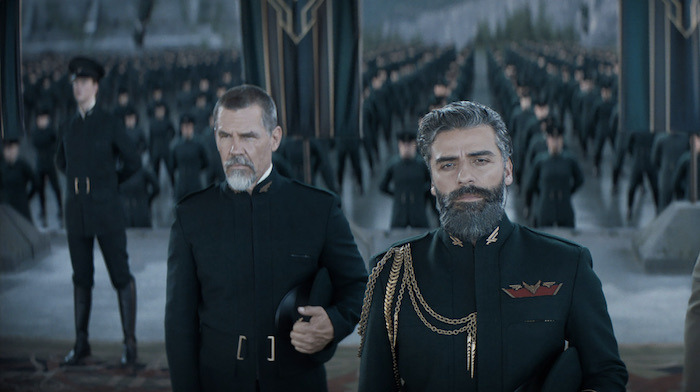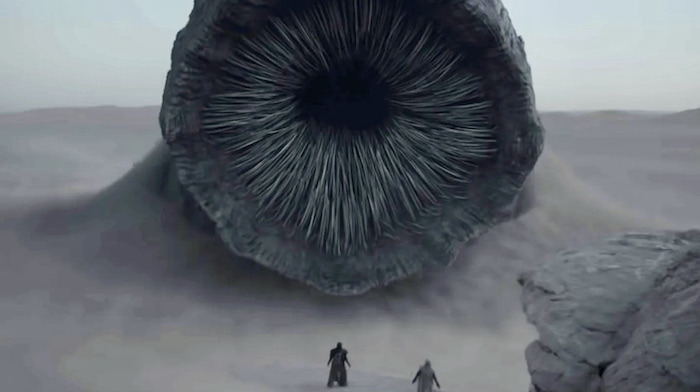Chloé Zhao Was "Blown Away" By Denis Villeneuve's 'Dune,' Is "Terrified" It Won't Be Seen In Theaters
Chloé Zhao, who won the Best Director Oscar this year for Nomadland and who is currently in post-production on Marvel's The Eternals, has seen Denis Villeneuve's Dune and she has some high praise for it — along with some thoughts about what it might herald for cinema's future.IndieWire reports that the September 2021 issue of Sight & Sound magazine has an interview with Zhao, wherein it asks her for her thoughts about the future of the cinematic medium. In the process of answering, she revealed that she had just seen Dune and that it had her "feeling pretty bullish on the current state of cinema — artistically, at least."
That's how the magazine characterized her thoughts. Here's a direct quote from Zhao:
"It gives me hope that a filmmaker like Denis is able to really harness his vision and put together something that's so incredible, so cinematic. I'm just blown away by the experience I had in that room. But I'm terrified about how many people are or aren't going to have that experience like I did, in a theatre, and what that means for the future."
Lucky her: she got to see Dune early and on the big screen. Maybe it's worth unpacking that a little more ...
Love for the Audience
IndieWire also quotes from an essay that Villeneuve wrote for Variety last December. This essay came hot on the heels of the bombshell announcement from Warner Bros. that it would be giving its entire 2021 movie slate a simultaneous theatrical/HBO Max release. Villeneuve was one of the high-profile filmmakers who was blindsided by the announcement.
Dune is a Warner Bros. picture. It only covers the first half of Frank Herbert's novel and was supposed to be the first of two movies, so Villeneuve and his planned sequel have a lot riding on its commercial success. In the essay, he had this to say about the studio's simultaneous-release strategy:
"There is absolutely no love for cinema, nor for the audience here. It is all about the survival of a telecom mammoth, one that is currently bearing an astronomical debt of more than $150 billion. Therefore, even though 'Dune' is about cinema and audiences, AT&T is about its own survival on Wall Street. With HBO Max's launch a failure thus far, AT&T decided to sacrifice Warner Bros.' entire 2021 slate in a desperate attempt to grab the audience's attention."
Note that he uses the word "audience" three times there. I'm a fan of Villeneuve's work; I think he was one of the best new directors to break out in the 2010s. Yet it always strikes me as slightly disingenuous when you have filmmakers out there in the middle of an ongoing pandemic, talking up the sacredness of the theatrical experience, speaking as though they have the audience's best interests in mind (and not their own art).
Zhao expressed terror at the idea of people not seeing Dune in theaters and having the same big-screen experience that she did. What about movie-lovers who are terrified of the coronavirus and just want to be safe and not put their own health at risk so they can watch some impeccably crafted sandworms? Are they somehow less enthusiastic about cinema than, say, a member of the Academy of Motion Picture Arts and Sciences, watching a digital screener at home?
Filmmakers like Villeneuve and Zhao sometimes sound as if they're operating based on their own idealized notions of what the theatrical experience is or should be, as opposed to firsthand knowledge of what it usually is for the rest of the general moviegoing public (us commoners). Keep in mind, Zhao is a VIP who was coming from an advance screening of Dune, which is not available for John Q. Public to see yet. We don't know the full conditions of that screening but it seems doubtful that it would be anything like what you or I would experience in a noisy, crowded auditorium at our local AMC 20 or some such multiplex.
The Importance of the Single Effect in the Screen Tale
Everyone's location and situation will be different, but in my neck of the woods, we're still posting record Covid case numbers. The last film I saw in a theater — one of the only true moviegoing experiences I've had in 2020 and 2021 — was Christopher Nolan's Tenet. Like Villeneuve, Nolan is a fierce proponent of theaters. He would probably be shocked and dismayed to see someone fast-forwarding through "the boring parts" of a new movie on their iPad.
I've seen people do that and it just hammered home to me that the single greatest benefit of movie theaters is not so much the communal aspect they bring, but rather the simple fact that they (theoretically) get people to sit still and focus on a narrative in front of a huge screen. Like short stories, movies have historically been able to tap into what Edgar Allan Poe called "the importance of the single effect in a prose tale." On the big screen, they command our attention and allow us to get absorbed in a story and thereby feel something, an emotion, that great "single effect."
Smartphones have made it harder to cut out all distractions, which just means that filmmakers have to work that much harder to seize people's attention — and keep it for the duration of two hours. In the past, you might say a movie like Dune was "unmissable." For tablet users, however, it and other future films might need to up their game and make sure their stories are good enough that they're "unputdownable," like a good page-turner.
Welcome, Hollywood, to the wide world of potential storytelling disruptions that novelists like Frank Herbert have been dealing with for decades upon centuries.
Dune opens the Venice Film Festival on September 3, 2021. For non-attendees, it will be available to screen in theaters and on HBO Max on October 22, 2021.


